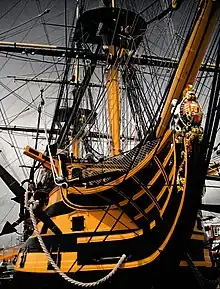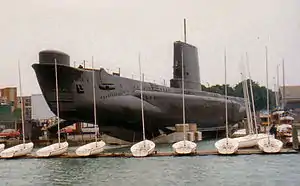 National Museum of the Royal Navy official logo | |
| Established | 2009 |
|---|---|
| Director | Dominic Tweddle |
| Website | nmrn.org.uk |
The National Museum of the Royal Navy was created in early 2009 to act as a single non-departmental public body for the museums of the Royal Navy. With venues across the United Kingdom, the museums detail the history of the Royal Navy operating on and under the sea, on land and in the air.
Museums
The National Museum of the Royal Navy:
| Museum | Location | |
|---|---|---|
 |
National Museum of the Royal Navy, Hartlepool | Jackson Dock, Hartlepool[1] |
 |
National Museum of the Royal Navy, Portsmouth | Portsmouth Dockyard, Hampshire[1] |
 |
Royal Marines Museum | Closed April 2017[2] |
 |
Royal Navy Submarine Museum | Gosport, Hampshire |
 |
Fleet Air Arm Museum | RNAS Yeovilton, Ilchester, Somerset |
 |
Explosion Museum of Naval Firepower | Gosport, Hampshire[3] |
Historic ships
Ships of the National Museum of the Royal Navy include:
| Museum | Location | |
|---|---|---|
 |
HMS Victory | Portsmouth Dockyard
Hampshire[4] |
 |
HMS Trincomalee | Hartlepool[5] |
 |
HMS Warrior | Portsmouth Dockyard
Hampshire |
 |
HMS Caroline | Belfast |
 |
HMS M.33 | Portsmouth Dockyard
Hampshire |
 |
HMS Alliance | Portsmouth Dockyard
Hampshire |
Background
In the financial year starting 1 April 2009, the NMRN co-ordinated Grants in Aid from the UK Ministry of Defence and the four original museums became integral parts of the NMRN.
The NMRN is also the custodian of HMS Victory, Admiral Lord Nelson's flagship at the Battle of Trafalgar in 1805.
HMS Alliance, the only surviving British Second World War submarine, re-opened following a £7 million conservation and restoration project, in 2014.
On 3 April 2014, The Babcock Galleries opened at the NMRN's Portsmouth Museum. The £4.5M project created 'HMS' – the Hear My Story exhibition, which tells the story of the 20th and 21st Century Royal Navy and its people, and a special exhibition space.[6]
In October 2014, the Museum received funding to restore D-Day Landing Craft (Tank) LCT 7074. The craft was raised from where it had sunk at moorings in Birkenhead, and was transported to Portsmouth for conservation.[7]
In August 2015, the First World War Monitor HMS M.33, currently undergoing restoration, opened to the public.[8] In December the same year, the museum acquired RML 497, a Second World War motor launch.[9]
HMS Caroline, Belfast, joined the museum on 31 May 2016, on the centenary of the Battle of Jutland.
HMS Warrior was transferred to the museum in 2017 from the Warrior Preservation Trust, and the museum has helped finish ongoing HLF Works as well as undertaking a further restoration of the ship, including new paintwork on the ship's hull.
References
- 1 2 "National Museum of the Royal Navy". National Museum of the Royal Navy. Retrieved 20 September 2016.
- ↑ "Marines museum to close for three years as part of move to Portsmouth dockyard".
- ↑ "Explosion! taken over by NMRN - Museums Association". Retrieved 28 May 2016.
- ↑ "£50m for HMS Victory". National Museum of the Royal Navy. Retrieved 28 May 2016.
- ↑ "Last of Nelson's frigates HMS Trincomalee joins illustrious fleet national museum". National Museum of the Royal Navy. Retrieved 28 May 2016.
- ↑ "HMS - Hear My Story". Retrieved 28 May 2016.
- ↑ "The last Landing Craft from the Second World War saved for the nation". Retrieved 28 May 2016.
- ↑ "Monitor HMS M33". Retrieved 28 May 2016.
- ↑ "'Amazing Survivor' Acquired by the National Museum of the Royal Navy". Retrieved 16 December 2015.